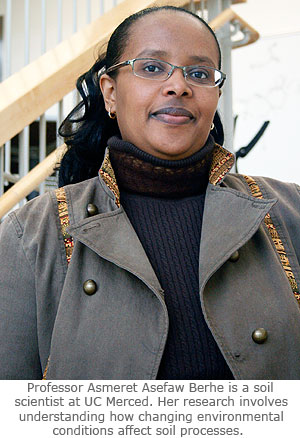

When
Asmeret Asefaw Berhestarted college, her initial goal was to become a medical doctor.
But over time, she diverted her attention to
research, focusing on the applied aspects of natural science. She left medicine behind and chose another career that is a bit more “grounded.”
She is a soil scientist.
Berhe joined UC Merced’s
School of Natural Sciencesearlier this year and teaches soil science courses and conducts research relating to terrestrial biogeochemistry.
While helping people take care of their physical health was a noble endeavor, Berhe’s passion for sustainable management of environmental resources and desire to advance society’s understanding of the role the soil system plays in climate change swayed her decision.
She studied soil and water conservationwhile an undergraduate at the University of Asmara in Eritrea, where she is from originally. Eritrea is located in northeast Africa and borders the Red Sea.
When she came to the United States to earn a master’s degree at Michigan State University, she studied political ecology to better understand the scientific, social and political issues that affect land use. ”I felt that I needed that social science perspective in order to see the bigger importance of what (soil scientists) do,” Berhe said.
At UC Merced, Berhe’s research aims to understand how changing environmental conditions affect vital soil processes.
Her labstudies soil processes in areas where the land has or is experiencing natural and/or man-made perturbations. She and her team examine how soil is impacted by factors such as climate change, erosion, fire and even armed conflict.
Growing up during Eritrea’s struggle for independence from Ethiopia, Berhe saw first-hand how the devices of war - specifically landmines - affected a nation’s people and their environment.
“Landmines are mostly discussed as a humanitarian issue,” Berhe said. “You rarely hear of landmines in terms of the role they play in land degradation but it’s a horrible reality that people in some parts of the world have to live with every day. Even after the war stops, the landmines are still there. People have to live in environments where their natural resources are destroyed or they can’t access remaining resources for fear of landmine explosions.”
Her chosen field allows her to engage in applied science. “I was not a fan of pure science,” she said. “I wanted to do something more practical, work that I could feel and touch and things that readily affected people’s lives.”
Berhe isn’t the only one in her family interested in soil. Husband
Teamrat A. Ghezzehei, teaches soil physics here at UC Merced.
“I feel like this area is perfect for what we do,” she said. “It’s a prime research location.”






